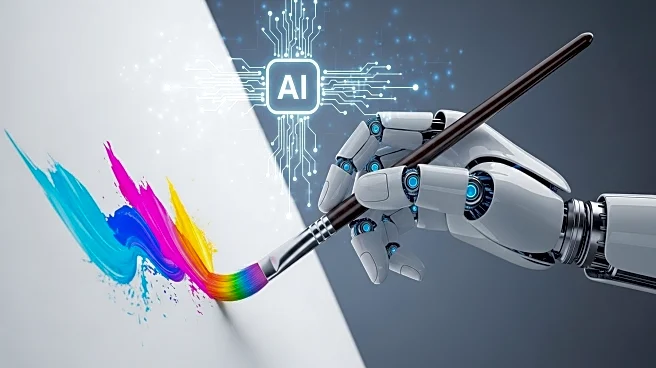What's Happening?
YouTube has unveiled a range of generative artificial intelligence products designed to enhance content creation and engagement on its platform. These tools, announced at the Made on YouTube event in New York, aim to support creators, particularly those producing short-form content known as YouTube Shorts. The new offerings include Veo 3 Fast, a Google DeepMind model capable of generating realistic video and audio from text prompts, and Ask Studio, a conversational AI tool providing feedback and analytics to creators. YouTube's chief product officer, Johanna Voolich, highlighted the platform's commitment to empowering creators, noting that YouTube has paid over $100 billion to creators globally in the past four years. The AI tools will allow creators to add special effects, generate video clips for podcasts, and create highlight reels for video podcasts. Additionally, YouTube is enhancing its dubbing technology and introducing a speech-to-song capability powered by DeepMind's AI music model Lyria 2.
Why It's Important?
The introduction of these AI tools by YouTube represents a significant shift in the digital content creation landscape, offering creators new ways to enhance their work and reach wider audiences. This move is part of a broader trend among social media platforms to integrate AI technologies, as seen with Meta and Elon Musk's initiatives. For creators, these tools provide opportunities to streamline content production and improve engagement, potentially leading to increased revenue and visibility. Brands also stand to benefit, as AI will facilitate collaborations with creators and enhance product tagging in videos. However, the rise of AI-generated content poses challenges, including the risk of misinformation and unauthorized use of personal likenesses. YouTube's efforts to address these issues, such as expanding access to detection tools, underscore the importance of responsible AI use in protecting creators and their businesses.
What's Next?
YouTube plans to roll out these AI tools to creators in the coming months, with features like Veo 3 Fast becoming available early next year. The platform will continue to refine its AI capabilities, including improving dubbing technology and expanding the speech-to-song feature. As AI integration deepens, creators and brands will likely explore new collaborative opportunities, leveraging AI to enhance content and marketing strategies. The broader social media industry will watch closely as YouTube's AI initiatives unfold, potentially influencing similar developments across other platforms. Stakeholders, including creators, advertisers, and consumers, will need to navigate the evolving landscape, balancing innovation with ethical considerations.
Beyond the Headlines
The deployment of AI tools by YouTube may have long-term implications for the creative industry, potentially reshaping how content is produced and consumed. As AI becomes more prevalent, creators might face ethical dilemmas regarding the authenticity of their work and the use of AI-generated elements. The cultural impact of AI-driven content could lead to shifts in audience expectations and engagement patterns. Additionally, the integration of AI in content creation raises questions about intellectual property rights and the protection of personal likenesses, prompting discussions on legal frameworks and industry standards.











